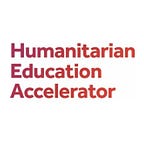HEA Phase 1 Cohort: Caritas Switzerland — Essence of Learning (EoL)
Learn more about the grantees from our first HEA cohort, including some of their learnings on the journey to scale.
What is the innovation?:
EoL is an integrated pedagogical, psychosocial learning programme that uses everyday recycled materials in an innovative approach to promote children’s ability to learn, preparing children in conflict and crisis situations for a successful reintegration into school.
What is the education focus?:
Psychosocial learning support programme
Scale:
Programme adaptations for scaling:
- With HEA support, Caritas developed a monitoring system to measure the outcomes and expected impact of the EoL programme, providing more precise information on the underlying assumptions within the theory of change. This will help Caritas to better understand if the inputs and activities of the programme lead to results and desired outcomes, as well as how much of the perceived changes can be attributed to the EoL programme. This process also made Caritas more sensitive to using validated monitoring tools and questionnaires.
- The team tested an outcome-monitoring tool based on children’s drawings, which could provide insights on the recovery of children affected by conflict during their participation in EoL.
- In order to better understand which essential products are needed for successful scaling of EoL, Caritas — led by HEA scaling mentor, Ian Gray — defined the core elements of EoL that cannot be changed. During the elaboration of the ‘minimal viable product’, a handbook was created, defining the terminology and procedures of EoL. A training manual on how to train EoL trainers and educators was also elaborated to become more structured and provide more practical examples.
HEA Evaluation:
A process evaluation was undertaken on the implementation of the EoL programme in Bangladesh, including a retrospective study to synthesize learnings from the implementation of the programme in Bangladesh, Kosovo and Romania.
Key learnings:
- Understanding and documentation of essential programme components is key to effective and sustainable scaling: The trial and development of a scalable product, based on the essential components of EoL and described in measurable processes (laid down in an EoL handbook) has been a crucial development in the EoL scaling journey. Previously Caritas piloted and re-piloted the EoL programme in different locations, interpreting and adapting it in collaboration with local partners, which whilst ensuring flexibility, resulted in high costs and difficulty in measuring impact.
- The development of a scalable product requires an advanced financial investment that can be tricky for NGOs: Increased flexibility by donors is therefore needed to support NGOs and other humanitarian organisations for scale.
- Producing a scalable product can mean a reduction in flexibility for the programme approach: Whilst a scalable product reduces cost over the long term and allows room for creating a tested and validated solution, having a much better defined product can lead to more rigidity. Negotiating these challenges together with partners is a key part of the process, to ensure that partners understand how to roll out the programme in the most effective manner and can adequately plan for the resources and time needed.
Read our case study on Essence of Learning in Bangladesh for more information about the approach: https://medium.com/hea-learning-series/case-study-essence-of-learning-in-coxs-bazar-bangladesh-6f1826d6926
